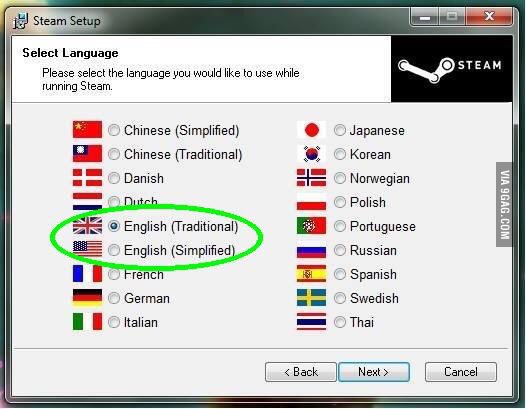I saw a funny picture today (see below) of an installation process that asked the user whether they would like to continue in “Traditional English” (with a British flag) or “Simplified English” (with an American flag).
The picture itself is probably photoshopped (or it is a little Easter egg in the software), but the message appeals to many people’s prejudices. Why is that? Is American English a “simplified version” of British English? I will try to answer these questions in this article.

Two varieties associated with two different social classes
I believe the main reason why many people think that British English is somehow more sophisticated than American English is the context in which the two varieties are used by the media. American film industry has been tremendously successful, and, as a result, many people around the world associate American English with the type of English used in American films of all genres, especially action films, which tend to employ “easy” and colloquial language to appeal to a wide audience.
On the other hand, British English is mostly known thanks to BBC documentaries, historical drama, discussions with prominent public figures, and Victorian literature. The dialects spoken and vocabulary used in such contexts would be considered “posh” even by the majority of Britons.
As a result, British English is commonly used as a tool by the American film industry to create the impression of a show being “historical” or “posh”, which further reinforces the stereotype. For instance, Game of Thrones and The Lord of the Rings were shot almost entirely in various British dialects.
Many people subscribe to this artificially created stereotype: British = intelligent, historical, posh; American = redneck, primitive.
Language in former colonies tends to be more conservative
When settlers set out to find a new home, they had to have the means to do so. Nowadays we can just take a plane and pretty much buy everything we need later on, but settlers 500 years ago didn’t have this luxury. Not only did they have to take their belongings with them on a ship, but they also had to be able to get them to the ship.
Most people couldn’t even afford a horse, let alone travel a hundred miles to the closest port. Only people from certain parts of Britain were able colonize America, and, as a result, American dialects tend to be much more closely related to one another than British dialects (where some Scottish dialects are hardly intelligible to a Southerner).
A wide variety of dialects in a small area creates tension, and tension drives change. To illustrate this using a rather extreme example, let’s take a look at Cockney rhyming slang. Cockney, an English dialect native to eastern London, has developed a way of referring to things and actions based on words rhyming with their names.
Even Britons who do not speak Cockney English are usually familiar with a few Cockney expressions (or create new ones) and occasionally use them as a joke. You could hear a Briton ask,
with the answer being “yes”, not “what?”, which is what most Americans would say to this question meaning “Would you believe it?”. One particular dialect influenced the development of many other dialects, which is less likely to happen in America, where dialects are few and far between.
In terms of grammar, vocabulary, and pronunciation, American dialects tend to be more conservative than British Dialects. One example is the American use of the present subjunctive, which has all but disappeared in most registers of British English, apart from the most formal ones. While it is completely acceptable to say
in American English (where “he come” is in the present subjunctive mood), most speakers of British English would use one of the following variants:
It is very important that he should come on time.
The first sentence is ambiguous, and “should” in the second sentence is used in a rather illogical way, but still, most Britons consider them more natural than the traditional “he come”.
I think you will agree that a more conservative variety of a language can hardly be called “simplified”.
Conclusion
It is not true that British English is more traditional or that American English is simplified. Even though both forms have been changing since the 16th century, there is very little difference between them in formal registers (mostly in pronunciation and a few grammar rules). Differences in informal registers are more significant, but there are no objective reasons to consider any dialect superior to another.
 Tip: Are you a non-native English speaker? I have just finished creating a
Tip: Are you a non-native English speaker? I have just finished creating a  Web App
Web App
